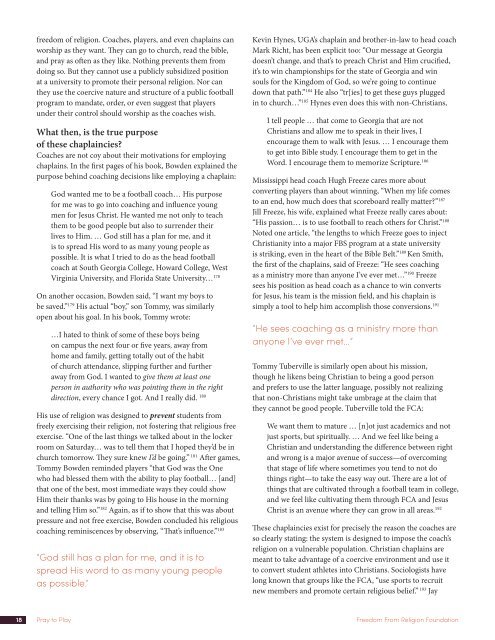Pray Play
PraytoPlay
PraytoPlay
You also want an ePaper? Increase the reach of your titles
YUMPU automatically turns print PDFs into web optimized ePapers that Google loves.
freedom of religion. Coaches, players, and even chaplains canworship as they want. They can go to church, read the bible,and pray as often as they like. Nothing prevents them fromdoing so. But they cannot use a publicly subsidized positionat a university to promote their personal religion. Nor canthey use the coercive nature and structure of a public footballprogram to mandate, order, or even suggest that playersunder their control should worship as the coaches wish.What then, is the true purposeof these chaplaincies?Coaches are not coy about their motivations for employingchaplains. In the first pages of his book, Bowden explained thepurpose behind coaching decisions like employing a chaplain:God wanted me to be a football coach… His purposefor me was to go into coaching and influence youngmen for Jesus Christ. He wanted me not only to teachthem to be good people but also to surrender theirlives to Him. … God still has a plan for me, and itis to spread His word to as many young people aspossible. It is what I tried to do as the head footballcoach at South Georgia College, Howard College, WestVirginia University, and Florida State University… 178On another occasion, Bowden said, “I want my boys tobe saved.” 179 His actual “boy,” son Tommy, was similarlyopen about his goal. In his book, Tommy wrote:…I hated to think of some of these boys beingon campus the next four or five years, away fromhome and family, getting totally out of the habitof church attendance, slipping further and furtheraway from God. I wanted to give them at least oneperson in authority who was pointing them in the rightdirection, every chance I got. And I really did. 180His use of religion was designed to prevent students fromfreely exercising their religion, not fostering that religious freeexercise. “One of the last things we talked about in the lockerroom on Saturday… was to tell them that I hoped they’d be inchurch tomorrow. They sure knew I’d be going.” 181 After games,Tommy Bowden reminded players “that God was the Onewho had blessed them with the ability to play football… [and]that one of the best, most immediate ways they could showHim their thanks was by going to His house in the morningand telling Him so.” 182 Again, as if to show that this was aboutpressure and not free exercise, Bowden concluded his religiouscoaching reminiscences by observing, “That’s influence.” 183“God still has a plan for me, and it is tospread His word to as many young peopleas possible.”Kevin Hynes, UGA’s chaplain and brother-in-law to head coachMark Richt, has been explicit too: “Our message at Georgiadoesn’t change, and that’s to preach Christ and Him crucified,it’s to win championships for the state of Georgia and winsouls for the Kingdom of God, so we’re going to continuedown that path.” 184 He also “tr[ies] to get these guys pluggedin to church…” 185 Hynes even does this with non-Christians,I tell people … that come to Georgia that are notChristians and allow me to speak in their lives, Iencourage them to walk with Jesus. … I encourage themto get into Bible study. I encourage them to get in theWord. I encourage them to memorize Scripture. 186Mississippi head coach Hugh Freeze cares more aboutconverting players than about winning, “When my life comesto an end, how much does that scoreboard really matter?” 187Jill Freeze, his wife, explained what Freeze really cares about:“His passion… is to use football to reach others for Christ.” 188Noted one article, “the lengths to which Freeze goes to injectChristianity into a major FBS program at a state universityis striking, even in the heart of the Bible Belt.” 189 Ken Smith,the first of the chaplains, said of Freeze: “He sees coachingas a ministry more than anyone I’ve ever met…” 190 Freezesees his position as head coach as a chance to win convertsfor Jesus, his team is the mission field, and his chaplain issimply a tool to help him accomplish those conversions. 191“He sees coaching as a ministry more thananyone I’ve ever met…”Tommy Tuberville is similarly open about his mission,though he likens being Christian to being a good personand prefers to use the latter language, possibly not realizingthat non-Christians might take umbrage at the claim thatthey cannot be good people. Tuberville told the FCA:We want them to mature … [n]ot just academics and notjust sports, but spiritually. … And we feel like being aChristian and understanding the difference between rightand wrong is a major avenue of success—of overcomingthat stage of life where sometimes you tend to not dothings right—to take the easy way out. There are a lot ofthings that are cultivated through a football team in college,and we feel like cultivating them through FCA and JesusChrist is an avenue where they can grow in all areas. 192These chaplaincies exist for precisely the reason the coaches areso clearly stating: the system is designed to impose the coach’sreligion on a vulnerable population. Christian chaplains aremeant to take advantage of a coercive environment and use itto convert student athletes into Christians. Sociologists havelong known that groups like the FCA, “use sports to recruitnew members and promote certain religious belief.” 193 Jay18 <strong>Pray</strong> to <strong>Play</strong> Freedom From Religion Foundation


